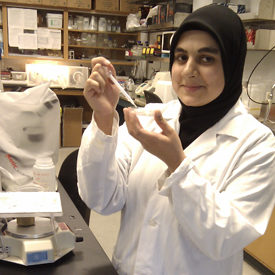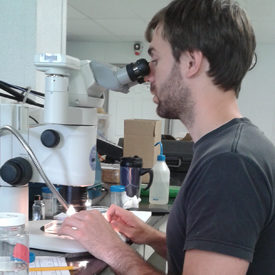Both the M.Sc. and Ph.D. are designed to give students in-depth knowledge and research expertise in a specific area of Biology. Students work closely with their supervisor’s to develop research questions, learn the critical skills needed for research, write up their research as a thesis and prepare their thesis for publication. Faculty encourage and support their students in presenting their research at regional, national, international conferences.
Master of Science (MSc) in Biology
At the master’s level, students work closely with a supervisor and their research is supported by that supervisor. Thus, no student is accepted into the program unless a faculty member agrees to supervise that student.

Satisfactory progress in research constitutes credit for the mandatory BIOL 6021 3.0 (first year) and BIOL 6022 3.0 (second year) courses, which are during the Winter term, MSc Research Progress Evaluation exercises. All entering students develop a research proposal with their supervisor and have a formal committee meeting (including completion of a Research Progress Evaluation form) in the first term of their degree studies. Progress in research is monitored by the Supervisory Committee (usually the supervisor plus one other faculty) through meetings with the student. The MSc Research Progress Evaluation, during the Winter term, in the second and fifth terms of study, requires that students submit a written report of their research findings, present and review their research and course work progress with their supervisory committee. In the event of failure to achieve satisfactory progress, the student will normally be required to withdraw from the program.
In addition, each MSc student must take a minimum of 6 credits from Biology Graduate Courses, including one of BIOL5038 1.5 (Current Topics in Molecular and Cellular Biology), BIOL 5086 1.5 (Critical Skills in Ecology and Evolution), or BIOL 5100 1.5 (Critical Skills in Animal Physiology). MSc students in the Neuroscience Graduate Diploma program may take BIOL 5146 3.0 (Fundamentals in Neuroscience I) in lieu of BIOL 5038, BIOL 5086 or BIOL 5100.
In some cases, students may be required by their supervisory committee to take up to two full undergraduate courses (or equivalent) in biological science if this deemed is necessary to strengthen the student’s background.
Candidates must conduct a laboratory or field research project and report the results in appropriate thesis form. The research and thesis should show independence, originality, and understanding of the area of investigation. While the thesis may not be published as is, the research should be presented according to publication-quality standards in the field of study. After the formal submission of the thesis, which requires supervisory committee approval, an oral examination is held centering on the research thesis and related topics. The research thesis must be approved by a majority of the examining committee prior to final submission to the Faculty of Graduate Studies.
Full-time candidates should normally complete all requirements for the MSc degree in biology within two years of full time study. Subsequent years will be permitted only as a part-time student, in which case students are not guaranteed financial support.
Doctor of Philosophy (PhD) in Biology
At the PhD level, students work closely with a supervisor and their research is supported by that supervisor. Thus, no student is accepted into the program unless a faculty member agrees to supervise that student.

Satisfactory progress in research constitutes credit for the mandatory BIOL 7021 3.0 (first year), BIOL 7022 3.0 (second year), BIOL 7023 3.0 (third year) and BIOL 7024 (fourth year) courses, which are the annual PhD Research Progress Evaluation exercises. All entering students develop a research proposal with their supervisor in the first two terms of their degree studies and hold a committee meeting in their first term of study. Progress in research is monitored by the Supervisory Committee (usually the supervisor plus two other faculty) through meetings with the student. The PhD Research Progress Evaluation, usually in the spring of each year, requires that students submit a written report of their research findings, present and review their research and course work progress with their supervisory committee. In the event of failure to achieve satisfactory progress, the student will normally be required to withdraw from the program.
Students may be required to take a maximum of 6 credits of graduate courses (or equivalent) in biological sciences, if this is deemed necessary to strengthen the student’s background.
Students who transfer internally from the MSc to PhD program, (PhD preliminary Transfer Examination) must have completed the 6 credit course requirements for the MSc.
Candidates (PhD II) must satisfactorily pass a preliminary examination before advancing in status to PhD III.
For students entering the program with a master’s degree, the examination must be held within 18 months after the student begins the PhD. For students converting from a master’s to a PhD program, the examination must be held within 20 months of first registering in the master’s program.
If the preliminary examination falls within two months of the annual Research Progress Evaluation reports, the student is exempt from such a report that year.
MSc students transferring to the PhD program must pass their Preliminary Exam but also must apply to the PhD program by April (for September entry).
The objectives of this examination are to determine whether:
- the candidate has adequate background and intellectual ability to pursue independent research in the field approved by the supervisory committee;
- the proposed research is suitable for a PhD research program and
- the candidate has demonstrated aptitude for conducting the proposed research by means of adequate progress and productivity.
During the two to three-hour oral examination, based on a substantial written proposal and progress report, students must demonstrate adequate knowledge and understanding of the proposed research field and the broader areas of knowledge related to the field. Further details regarding the preliminary exam evaluation criteria can be found on our Guidelines, Policies & Forms page.
Candidates must prepare and submit a suitable dissertation based on original research carried out under the supervision of a supervisory committee. The research should demonstrate the candidate’s independence, originality, and understanding of the area of investigation at an advanced level. Some, or all, of the dissertation is expected to be sufficiently meritorious to be published in a peer-reviewed scientific journal. However, the dissertation research is not required to be submitted for publication, or published, prior to the oral examination. After the formal submission of the dissertation, which requires supervisory committee approval, an oral examination is held centering on the dissertation and related topics. The PhD dissertation must be approved by a majority of the examining committee prior to final submission to the Faculty of Graduate Studies.
Candidates may expect to spend, on the average, between four to six years to complete the requirements for the PhD degree. Students have a maximum of six years to complete their degree either full or part-time.

